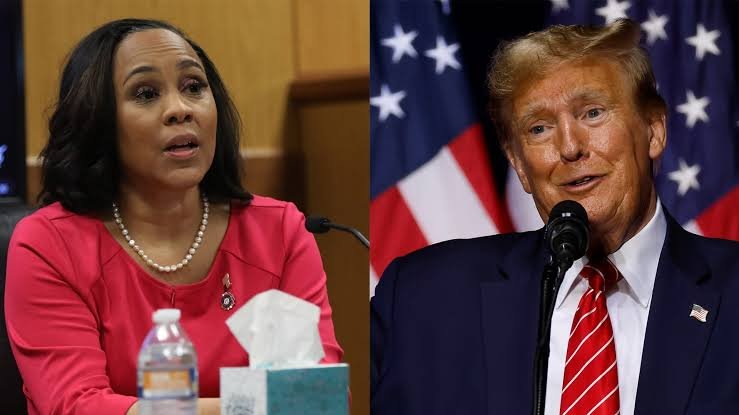Trump Appeals Ruling Letting Fani Willis Stay on Election Interference Case – On Friday, Donald Trump’s legal team attempted to challenge a Fulton County, Georgia judge’s ruling permitting Fani Willis to remain as the prosecutor in the state’s election interference case against the former president.
“The indictment should have been dismissed and, at a minimum, [District Attorney] Willis and her office should have been disqualified from prosecuting the case,” Trump’s attorney Steve Sadow said, in part, in the appeal filed on Friday to an appellate court in Georgia. In his ruling earlier this March, Fulton County Superior Court Judge Scott McAfee highlighted that case law provided limited guidance in his decision.
He stated that either Willis or her special prosecutor, Nathan Wade, needed to withdraw from the case due to their disclosed romantic relationship. The submission to Georgia’s state Court of Appeals, representing Trump and eight other defendants, contends that the appellate court should address precedent concerning “forensic misconduct,” which according to Georgia law mandates disqualification of a prosecutor.
People Also Read: Republican House Majority to Shrink as Mike Gallagher Steps Down
Additionally, it argues that McAfee should have identified an actual conflict of interest. Failing that, he should have disqualified Willis based on an address she provided following revelations in court filings by Ashleigh Merchant, an attorney for defendant Michael Roman, regarding her romantic involvement with Wade. In what it described as the “church speech”, the appeal said Willis “while concealing her personal relationship with Wade.”
“Improperly injected race and racial bias into the case, indicating that defendants and their counsel were racists for challenging her unethical conduct, that Defendants were guilty and would be convicted (boasting about her ‘superstar’ team with a ‘conviction rate of 95 percent’) and implying that that God himself had chosen her for this case, that he was on her side, and that she was doing His work in this prosecution”, the filing argues.
In his ruling, McAfee characterized Willis’ actions as a significant lapse in judgment, questioned her portrayal of the timeline of her relationship, and criticized her use of cash to cover expenses during vacations with Wade, suggesting it created a sense of dishonesty. However, McAfee refrained from directly accusing Willis of lying to the court.
The appeal contends that Willis provided dishonest testimony regarding the relationship, establishing an appearance of impropriety that warrants her removal. “The trial court labelled the cash repayments as ‘unusual’ and the lack of supporting documentation ‘understandably concerning,’” the filing states. “The trial court then went further, characterizing it is a ‘financial cloud of impropriety’.
“Stopping just short of calling their testimony regarding these alleged cash payments an outright fabrication, the trial court half-heartedly said that her testimony on this issue was ‘not so incredible as to be inherently unbelievable’.” If the court agrees to hear the appeal, it’s likely to focus on clarifying the boundaries of what prosecutors can and cannot publicly discuss about a case, explained Anthony Michael Kreis, a constitutional law professor and political scientist at Georgia State University College of Law.
People Also Read: US Supreme Court Allows Congress to View Trump’s Tax Returns
“There is much less case law about public statements that might require disqualification than governing actual conflicts of interest,” he said. “The appeals court will not disturb judge McAfee’s findings of fact, and so because he found no evidence of an actual conflict of interest and provided a remedy for the appearance of impropriety he said existed because of Willis and Wade’s relationship, they’re very unlikely to be interested in the relationship-based allegations of a conflict at all.”




